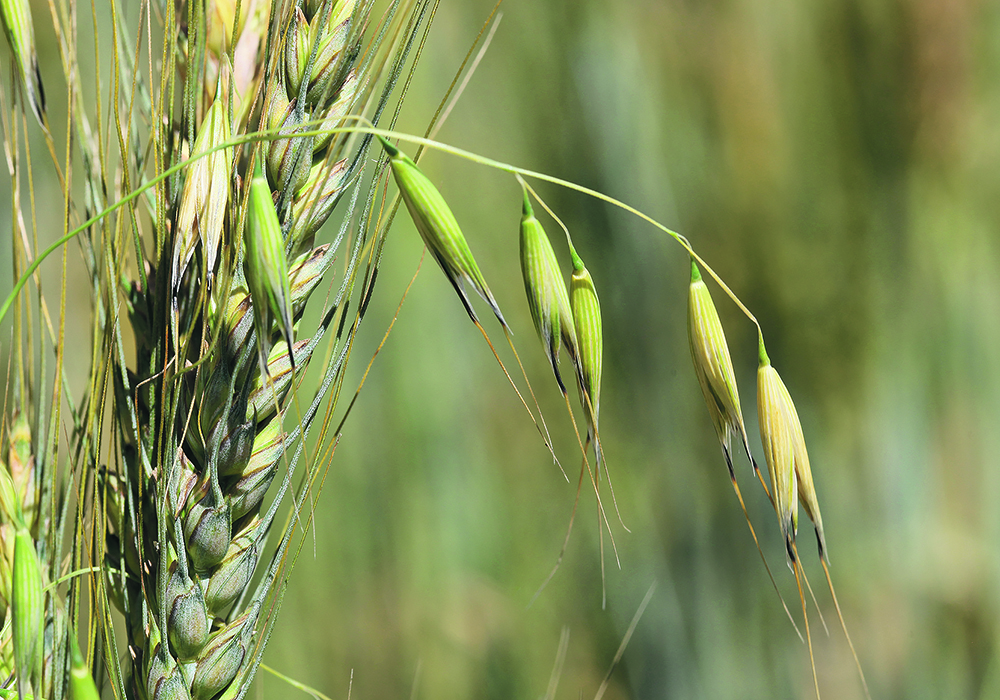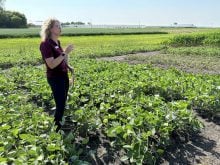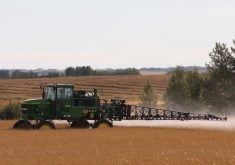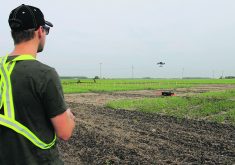WINNIPEG — Anyone who eats hot dogs or bacon has probably consumed liquid smoke. The flavour additive is also used in barbecue sauces, marinades and sometimes smoked cheese.
Shaun Sharpe, an Agriculture Canada scientist in Saskatoon, may have discovered another use for liquid smoke, which has nothing to do with sauces or smoked meat.
He thinks it could be used to control wild oats, a pesky weed on the Prairies.
Read Also

Fendt takes a combine on the road in the U.S.
Putting an Ideal combine in fields across different regions has given the brand a chance to prove that the combine is capable of performing well in a variety of conditions.
The weed scientist is studying the idea of convincing wild oat seeds to germinate in the fall rather than during the growing season.
“With wild oats, they have a particular type of dormancy. It’s called endo-dormancy. It’s an internal control that prevents it from immediately germinating,” Sharpe said from his office in Saskatoon.
He wanted to know if he could overcome that endodormancy by spraying liquid smoke on wild oat seeds to encourage germination.
The concept is based on the principle that wildfire smoke can stimulate plant growth.
“Although it is still being studied, researchers believe it may provide a ‘scorched earth’ survival signal, as seen through the rapid regrowth of plant communities following a fire,” says an Agriculture Canada document explaining Sharpe’s research project.
“The idea is to stimulate seeds to grow at the ‘wrong’ time of year and then die off, which would drive down their density in the seedbed over time.”
Instead of actual smoke, Sharpe was curious if liquid smoke could cause weed seeds to germinate.
Liquid smoke, also known as pyroligneous acid or wood vinegar, is a byproduct of biochar production.
“(That) occurs when a biomass is heated in an airless container during charcoal/biochar production,” says the website woodvinegar.org.
“The exhaust smoke from this charcoal production is condensed (cooled) into a liquid.”
To test the concept, Sharpe conducted lab experiments in which wild oat seeds were placed on soil or in soil.
Then, the soil and seeds were placed in a cabinet sprayer, which is a chamber used to apply pesticides in a lab.
Within that cabinet, Sharpe and his colleagues applied a mixture of liquid smoke and water to the wild oat seeds.
The result? About 10 per cent more seeds broke dormancy, compared to a control group that didn’t receive the liquid smoke.
“It’s still very exploratory at this point, (but) it does seem to be active and it does seem to stimulate emergence of wild oats,” Sharpe said, adding this tactic could force the wild oats to germinate in the fall, and then the emerging weeds would die over the winter.
As a result, fewer wild oat seeds would be around the following spring.
“Can we take pressure off the in-crop herbicides by being able to stimulate them (the weeds) out the soil at pre-seed or post harvest time?”
The full results from Sharpe’s study were published in 2023 and can be found at cdnsciencepub.com/doi/10.1139/cjps-2022-0202.
A 10 per cent increase isn’t a lot, but it does suggest that the concept can work, at least in a lab.
Sharpe plans to test liquid smoke and its ability to stimulate seed germination in the field in the near future.
Before he moves forward, Sharpe will need approval from the Pest Management Regulatory Agency.
Still, he believes the idea has merit.
Wild oat seeds can lay dormant in the soil for three to five years or even longer. Any practice that reduces the number of seeds in the soil is a win for growers because it’s becoming more difficult to kill wild oats with herbicides.
A 2020 paper from Hugh Beckie, a former Agriculture Canada weed scientist, found that 62 per cent of wild oats on the Prairies are resistant to Group 1 herbicides and 34 per cent are resistant to Group 2 herbicides.
The percentage of wild oats with resistance could be significantly higher in 2024.
So, cutting the amount of wild oat seeds in the soil seedbank is a good thing.
“This is a tactic to try and slow down herbicide resistance,” Sharpe said.
“To try to tackle it in a new way.”
















